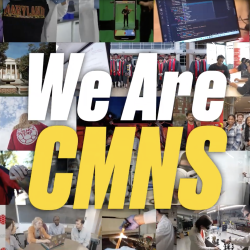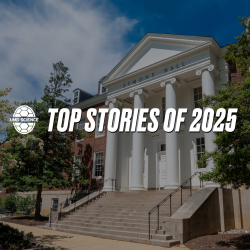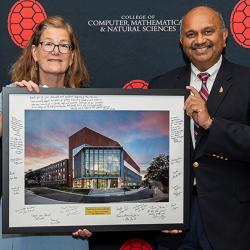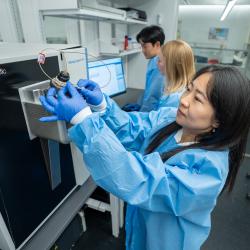Chemistry Alumnus Rick Capozza has a Good Eye
Following a successful career in the vision industry, Capozza gives back to today’s students.
Whether it’s being able to spot a great photo or creating technology to help people see better, Rick Capozza (Ph.D. ’69, chemistry) has the vision for it.

Capozza chose to attend the University of Maryland thanks to encouragement from his sister, who was working nearby at the National Security Agency and suggested he apply. He was interested in polymer science and was sold on the university once he learned that Professor William Bailey was doing work in that area.
Capozza’s time at UMD was life-changing in more ways than one. His research focused on organic chemistry and polymer science—a subfield of materials science concerned primarily with synthetic polymers such as plastics and elastomers. And as his studies progressed, he began to get a clearer picture of what he wanted to do with his career.
During his years in College Park, Capozza enjoyed campus life, spending his summers participating in department baseball games and building strong friendships, some that he still has to this day. And most notably, he met his wife, Barbara (B.S. ’68, elementary education), at an off-campus party. The two married in 1968.
After graduation, Capozza worked as a research scientist. It was during this time that he began developing a drug delivery system for treating eye problems, which launched his career in the vision industry.
“I ended up in the medical device ophthalmic industry because the medical device that I was developing was actually a biodegradable eye insert,” Capozza explained. “It could be placed in the lower cul-de-sac of the eye to deliver drugs to the eye over a sustained period of time instead of putting an eye drop in your eye and having the medicine trickle down your cheek.”
Following the development of the drug delivery system, Capozza was hired as the director of research at Syntex Opthalmics, a worldwide manufacturer of premium-priced, high-performance contact lens products. He was later promoted to vice president of research, and in 1981, Capozza was named president of the company. In 1985, the company was purchased by England-based company Pilkington Barnes Hind. Capozza worked for the company after the acquisition and served as its executive vice president from 1990 to 1996.
From there, Capozza became president of Autonomous Technologies Corp. (ATC), a company that developed new technologies for laser vision correction. In the mid-1990s, the company developed a laser vision correction system to treat myopia, and it was subsequently approved by the U.S. Food and Drug Administration. The system included a high-speed tracking system based on military technology that locked in on the rapid eye movements during surgery to improve the accuracy of the procedure. Capozza led the company through to an eventual sale to Summit Technologies Inc. and retired in 1998.
Even with his many successes, Capozza did not forget about the university that helped him get to where he is today. In November 2014, he established the Richard C. Capozza Graduate Student Award in Chemistry to support graduate students in the Department of Chemistry and Biochemistry.
“I created the student award in chemistry because I wanted to give something back to the university because it really impacted my life and career,” he said.
Capozza knows firsthand how an award like his can help students while they earn their degree.
“I received the DuPont Fellowship when I was at the University of Maryland and it was really helpful,” he recalled, “so I wanted to do something for the current graduate students in the department.”
Capozza now lives in Austin, Texas, and since retiring, he took up a hobby—photography—which has opened his eyes to a host of new possibilities. Over the last several years, Capozza has been able to travel and take photos across America and the world. He has visited many U.S. national parks, Kenya, South America, Iceland and many European countries.
“Africa was my favorite place to photograph because it is so different in many ways from the rest of the world,” Capozza said. “The people, wildlife and landscapes are amazing.”
Retirement gave this vision expert an opportunity to see the world in a new way.
“Photography offered me a place to go where I could use my technical and creative skills,” he said. “It gave me an experience where it really opened my eyes to the world around me—literally. You think you can see but you don’t really see until you spend time practicing it.”
Written by Chelsea Torres






